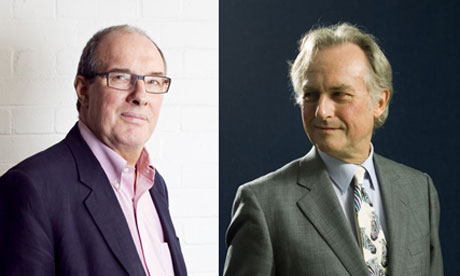By RICHARD DAWKINS - NEW STATESMAN
Added: Fri, 24 Feb 2012 12:48:08 UTC
This is a shortened version of Richard's article in the latest version of New Statesman, published here with their permission. We will link to the full article once it becomes available online.
Some years ago, a colleague was admitted to hospital and a nurse came over to her bedside to fill in her personal form. “Religion?” “None.” Later, my colleague overheard a pair of nurses gossiping about her. “She doesn’t look like a nun.”
The absurd presumption that everyone has a religion, almost as a part of their identity, to be ticked off on a form the way one ticks the boxes for sex, eye colour, and known allergies, is ubiquitous in our society and it has yet to be expunged from our census forms.
The census of 2001 seemed to show that over 70 per cent of British people were Christian. This figure has been triumphantly and repeatedly invoked by politicians, prelates, and apologists for religion, in apparently persuasive justification for a strong Christian presence in our governance and resource allocation. The census showed that we are still a Christian country, so it is claimed to be appropriate that all schoolchildren in England and Wales are required by law to take part in a “daily act of worship of a broadly Christian character”; right that 26 Bishops should have seats reserved for them in Parliament, where they influence political decisions in very Christian ways – on discriminatory faith schools, on abortion, on assisted suicide, for instance. Not just the unelected bishops: members of the Commons with an eye to re-election must heed the Christian voice and curry favour with this powerful demographic. Seventy per cent of the population want Christian policies, and 70 per cent cannot be gainsaid.
Many of us suspected that the vaunted 70 per cent hid an embarrassment of non-Christian, non-religious vaguery. “Well, our family has always been Christian and I was christened; I’m not a Jew or a Hindu and certainly not a Muslim, I love singing carols, Jesus was obviously a good person, just look at that gorgeous sunset, and there are more things in Heaven and Earth, Horatio, so . . . yes, I’d better tick the Christian box.”
Naturally people are free to call themselves whatever they like, and if you want to call yourself Christian even though you don’t believe in God and have only the haziest idea of Christian teaching, that’s none of my business. But it very much is my business, and every citizen’s business, if the recorded demographic strength of Christianity in the country is falsely inflated by a very broad and loose definition of what it means to be Christian, and that swollen figure is then hijacked and exploited by partisans of a much more narrowly defined Christianity. If you ticked the Christian box because (like me) you are moved to tears by Schubert and the Milky Way, and therefore consider yourself a ‘spiritual’ person, your ‘spirituality’ should not be used to justify bishops in the Lords, or ‘All Things Bright and Beautiful’ in school. Ditto if you ticked the Christian box because (again like me) you have a nostalgic affection for the Book of Common Prayer and King’s College chapel.
It was for this reason, among others, that many of us campaigned to have the religion question omitted from the 2011 census. Unfortunately we failed. The Richard Dawkins Foundation for Reason and Science (UK) therefore fell back on Plan B. This was to commission a large and comprehensive opinion poll, in the week immediately following Last year’s census, to find out exactly what people who ticked the Christian box really believe, what lay behind their decision to accept the Christian label, and their attitudes to Christian-based legislation. Can politicians and others plausibly quote the percentage calling themselves Christian as ammunition in arguments about religion in schools, homosexual rights, abortion and voting Lords Spiritual?
The survey was done by Ipsos MORI in accordance with its strict rules to ensure accuracy and impartiality, and on 14 February we published the results in the form of two press releases and a link to the underlying data (all now on richarddawkins.net together with links to the extensive press coverage). The main conclusions are very much as we suspected. . . .
[The large middle section of the article, not shown here, can be read in New Statesman magazine (not on-line until next week, when we’ll give the link). It mostly gives details of our Ipsos MORI poll results, with commentary on them. New Statesman has also drawn up a helpful diagrammatic summary of some of the main findings of the poll, which they have placed immediately after the article.]
The bottom line is that anybody who advocates a strong place for religion in government cannot get away with claiming that ours is numerically a Christian country as a basis for giving religion privileged influence.
Now finally, to my joke title. During one of the many broadcast discussions of our survey, I used a vignette to illustrate how poorly acquainted Census Christians seem to be with their Bible. Ipsos MORI asked them to identify the first book of the New Testament from a four-way choice of Matthew, Genesis, Acts of the Apostles and Psalms, plus “Don’t know” and “Prefer not to say.” Only thirty five per cent correctly chose Matthew, 39 per cent per cent didn’t even guess, and the rest chose various wrong answers.
This is a truly stunning result. It is as though 64 per cent of the people who self-identify as devotees of English literature were unable pick out the author of Hamlet from a four-way choice of Shakespeare, Tennyson, Chaucer and Homer. It’s not that ignorance of the sequence of the arbitrarily assembled canon of biblical scrolls matters in itself. The point is that this is a telling indicator of how utterly out of touch with Christian culture modern British people are, even those who signed on as Christian in the census.
How would a Christian apologist deal with this devastating result? Dr Giles Fraser was in the radio discussion, and he dealt with it by going to extraordinary lengths to deflect attention in another direction altogether. He scored what he obviously thought was a “Gotcha!” point by asking me whether I knew the full title of Darwin’s On the Origin of Species. He meant including the long, Victorian subtitle. I confidently said I knew it because, rather surprisingly, I do. But I then had one of those momentary lapses of memory that become increasingly common around my age. I stammered out an approximation, but was unable to recall the exact wording until I was cycling home and no longer under the pressure of speaking in a radio studio: “On the Origin of Species by means of natural selection – or the preservation of favoured races in the struggle for life.”
Canon Fraser (whom, incidentally, I greatly admire for of his principled stand on the St Paul’s tent protest) cannot seriously have thought the two cases were remotely comparable. The Census Christians were not asked to recite anything from memory, but simply to pick out “Matthew” from a choice of four. Even if they had been asked to recite it, “Matthew” is just one word, while the full title of Darwin’s great work has 21. The comparison is indeed so inappropriate that, far from being a real gotcha, Fraser’s diversionary tactic can only be seen as a measure of desperation, designed to conceal the embarrassing ignorance of their holy book shown by 64 per cent of Census Christians. In any case Darwin’s Origin, I hope I don’t have to add, is nobody’s holy book.
The argument was only the first in an astonishing series of diversionary moves in the national press this past week, some of them amounting to outright smear tactics. Perhaps the most absurd (of many) was the Sunday Telegraph hack who trumpeted a story that my remote ancestors had owned slaves in Jamaica. Well, that settles it: Dawkins is an atheist and his great great great great great great grandfather owned slaves. Gotcha! Case closed. I can quite understand why those whose aim is to protect at all costs the privileged status of Christianity in UK public life would want to deflect attention from the very significant findings of this important Ipsos MORI research. These are facts, not opinions, they aren't going to go away, and no amount of game-playing or smear tactics or irrelevant digression is going to change them.
In modern Britain, not even Christians put Christianity anywhere near the heart of their lives, and they don't want it put at the heart of public life either. David Cameron and Baroness Warsi, please take note.
This post was made using the Auto Blogging Software from WebMagnates.org This line will not appear when posts are made after activating the software to full version.



 Romney Defends Conservative Values, Says Obama Has ‘Secular Agenda’
Romney Defends Conservative Values, Says Obama Has ‘Secular Agenda’ Graham Not Sold on Obama’s Christianity, Santorum Warned of Satan in 2008
Graham Not Sold on Obama’s Christianity, Santorum Warned of Satan in 2008 The problem in public life isn’t Islam, but religion itself
The problem in public life isn’t Islam, but religion itself Religion for Atheists: a Non-Believer’s Guide to the Uses of Religion
Religion for Atheists: a Non-Believer’s Guide to the Uses of Religion "The nature of human beings and the question of their ultimate origin"
"The nature of human beings and the question of their ultimate origin"
 The issue of ‘faith’ is coming up even more than usual these past few weeks as the Republican primaries heat up and the remaining candidates are vying for the privilege of being the ‘most Christian’. We’ve seen the scramble over health insurance, hormonal contraceptives and ‘religious freedom’ (I foolishly thought the Constitution protected individual freedoms not the freedom of the Catholic church to dictate whether American citizens could be denied certain types of health insurance), but now we are getting to the heart of the issue.
The issue of ‘faith’ is coming up even more than usual these past few weeks as the Republican primaries heat up and the remaining candidates are vying for the privilege of being the ‘most Christian’. We’ve seen the scramble over health insurance, hormonal contraceptives and ‘religious freedom’ (I foolishly thought the Constitution protected individual freedoms not the freedom of the Catholic church to dictate whether American citizens could be denied certain types of health insurance), but now we are getting to the heart of the issue.
 "This is an unprecedented finding. Previously, the best existing treatment for Alzheimer's disease in mice required several months to reduce plaque in the brain."
"This is an unprecedented finding. Previously, the best existing treatment for Alzheimer's disease in mice required several months to reduce plaque in the brain." Three US citizens who lost their sight in childhood have reported a dramatic improvement in vision after having gene therapy in both eyes.
Three US citizens who lost their sight in childhood have reported a dramatic improvement in vision after having gene therapy in both eyes.


 Throughout the seventeenth century, European civilisation was tortured by religious conflict. Thomas Hobbes, John Locke and other political thinkers of the time wrote against a background of terrible dislocations: the wars of religion; religion-tinged political struggles between great European dynasties; and the ruinous conflict between the British Crown and parliament.
Throughout the seventeenth century, European civilisation was tortured by religious conflict. Thomas Hobbes, John Locke and other political thinkers of the time wrote against a background of terrible dislocations: the wars of religion; religion-tinged political struggles between great European dynasties; and the ruinous conflict between the British Crown and parliament.
